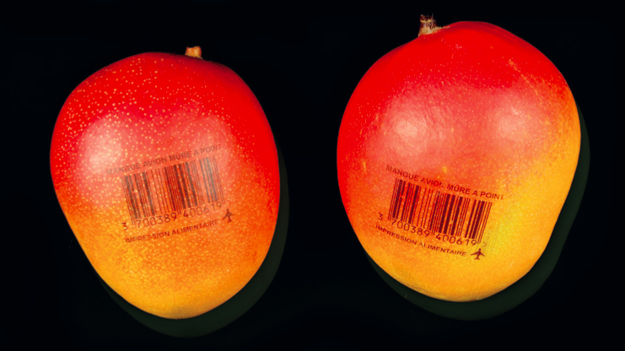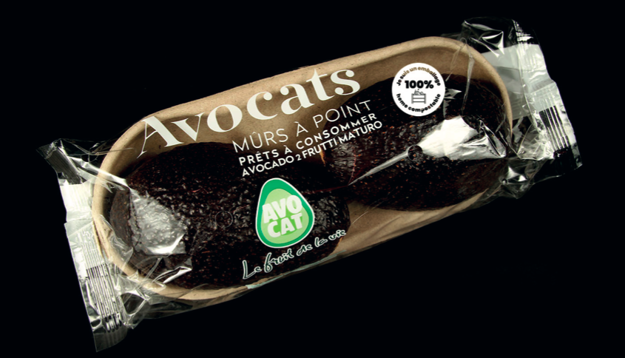According to an Ellen MacArthur Foundation study, «the ocean is expected to contain 1 tonne of plastic for every 3 tonnes of fish by 2025, and by 2050, more plastics than fish (by weight). In response to that environmental emergency, the Environment and Community Ministry launched France’s National Plastics Pact on 21 February 2019.
Target: 60% reusable, recyclable or compostable packaging in 2022 and 100% in 2025.
In the exotic fruit and vegetable sector, plastic packaging is a pressing issue that raises the challenge of developing eco-friendly solutions from the packaging to the labelling whilst maintaining the quality and traceability of fresh produce
The company Capexo is now making its contribution with two major innovations in exotic fruit and vegetable packaging and labelling, beating the official target by two years !

Innovation 1 : Exotic fruit and vegetable printing
The patented process, which Capexo owns for France, makes it possible to print food-grade ink on the skin of almost all fruit and vegetables, adding a barcode, price or any other consumer information. The innovation heralds the end of excess plastic packaging and stickers for exotic fruit and vegetables and more.
All exotic fruit and vegetables with a relatively smooth skin can be printed. Pineapple, for example, cannot. Grainy-skinned avocado can, but a barcode would not be legible enough to work properly at
the checkout. It is possible to print the sale price, however. The printing process also adapts to the fruit’s ripeness to avoid any possible damage.
Food safety guaranteed
The process involves patented, quality-tested food-grade inks — the same ones used in the pharmaceutical industry to coat tablets.
End of checkout shrinkage
In store, on-fruit printing avoids the problem of differentiating between, for example, an air-freighted and seaborne mango, which have different sale prices, at the supermarket checkout. The process removes all possible confusion as either the barcode or price is shown on each individual fruit.

Innovation 2 : Biocompostable punnet packaging
Ready to eat fruit sold in batches, such as ripe avocados or air-freighted bananas, needs punnet packaging to protect it and prevent checkout shrinkage. To replace the plastic film and punnet, which are at best recyclable, Capexo biocompostable packaging features cardboard sourced from sustainably managed birchwood forests, wrapped in a protective transparent film, which is also derived from birchwood, and heat-sealed on a flow-pack machine. That makes the punnet packaging fully biocompostable.
Corn starch-based biocompostable films are already available. As they may not be 100 % GMO-free, however, Capexo rejected that option as a precautionary measure.
Home composting
End consumers can throw the punnet and film away in their home compost bin, where they will naturally degrade in the same way as other compostable waste. Failing which, the packaging can be disposed of in a recycling bin.
Punnet traceability maintained
Capexo biocompostable packaging enables ecofriendly product traceability with a batch number, origin, best-before date and all other information required by consumers using food- grade ink.
Customer testimonial
The innovations are aimed at the specialist and generalist food retailers amongst Capexo’s customers. The retail group Cora shares its story. « Ahead of the upcoming legislative deadlines on plastic packaging and with the emphasis on CSR, Cora is rethinking its products’ packaging. Since November 2019, all our air-freighted Peru mangoes have been unpackaged. The barcode and consumer information — ‘product picked when ripe’ and ‘food-grade ink’ — are written straight on the mangoes’ skin using the on-fruit printing process developed and provided by our supplier Capexo with food-grade ink. As we also sell seaborne mangoes, that enables us to segment the product and avoid the problem of checkout shrinkage.
"For Cora, the innovative process enables us to maintain our mango sales and, like biocompostable labels, which are also used in our stores, that puts us in a virtuous circle and motivates consumers. It’s very positive," said Sophie Malinas, Fruit and Vegetable Procurement Manager at Cora retail group.
Interview of François Bellivier, Capexo Director of Development What does environmental innovation mean to Capexo ?
What does environmental innovation mean to Capexo ?
When the National Plastics Pact was launched in 2019, we’d already spent over a year developing the two innovations and incorporating them into our packaging chains. Like most people, we’re aware of the threat of plastic pollution, particularly in the oceans. Except that, as a fresh produce importer, we can and must bring our retail customers alternatives to plastic packaging.
At Capexo, we can’t reasonably talk about our products’ taste and nutritional quality without considering their packaging’s environmental impact.
The environmental impact also includes the shipping.
Yes, that’s important, but don’t forget that you need to take the
product’s entire lifecycle to calculate its carbon footprint. That said,
the air-freighted exotic fruit and vegetables we import only travel on commercial flights. We never charter cargo flights specially for our products. The two packaging innovations are part of a long-considered environmental policy at Capexo. But I want to stress that they’re not going to solve the excess plastic packaging problem alone. But they make a contribution and show that it’s the development of solutions tailored to each market that will enable effective widespread action. The food distribution sector is on the front line. Consumers are naturally looking to supermarkets.
It’s up to us to bring our customers ethical solutions that will help change the course of history. That’s also the customer service provided by Capexo.
The innovations are currently limited to your customers, and tomorrow?
Whether it’s us or another exotic fruit and vegetable importer, what matters is that similar solutions spread fast! The market
is big enough to be shared! We will have been the first, which is already a huge source of satisfaction in itself. Of course, we’re not going to stop when we’re clearly on the right track. Innovation has a future at Capexo ! I can also see the positive effects of our ambition inhouse. Our staff are proud to see that the company is taking its responsibilities seriously and innovating. Since Capexo is
a forward-looking company, this guarantees our employees a future. Environmental innovation has become the cornerstone of our CSR* as it has an impact across the environment, society and economy.
(*) Corporate Social Responsibility
About Capexo
Founded in 1996, the company Capexo imports and markets exotic fruit and vegetables in France under the Lilot Fruits brand. A key player at Rungis International Market, Capexo provides a constant supply of delicious and nutritious produce to wholesalers and the wholesale markets as well as specialist (Grand Frais, Métro, etc.) and generalist (Carrefour, Casino, Monoprix, etc.) food retailers.
Sharing the same high standards as its suppliers, Capexo selects produce from the finest sources. The company works closely with one of Reunion’s biggest cooperatives. 90% of the island’s air-freighted fruit is exported by Lilot Fruits.
Victoria pineapple, avocado, mango, passionfruit, lime, etc. are just some of Capexo’s flagship products.
For more informations :
François Bellivier
Tel. : 01 41 73 23 00
Mob. : 06 75 03 76 54
f.bellivier@capexo.fr
www.capexo.fr
